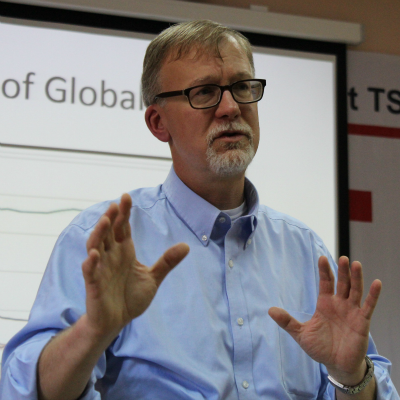On September 30, ISET hosted Dwight Nystrom, Chief of Political and Economic Affairs of the US Embassy. His presentation was titled: “The Reach and Limitations of American Economic Power” and it was focused on US’s footprint on the global economy. Mr. Nystrom also discussed US economic conditions within different sections. According to the data he provided, the US share of GDP in global GDP began declining in 2000 and after the 2008 global financial crisis it began to fall even more sharply. Furthermore, he mentioned merchandise trade partners over the last 35 years. In 1980 case the first three trade partners for US were Canada, Japan and Mexico, but in 2014 Japan was replaced by China. This phenomenon exists for several reasons, but the primary cause is the cheap labor force of China. However, US still remains attractive place for investors, because it still leads the world in foreign direct investment and several other key indicators.
Furthermore, Mr. Nystrom discussed literacy rates around the world. It turns out that US is very literate. One of the factors that can determine literacy of US could potentially be other countries’ brain drain, since the US attracts lots of clever and intelligent people from other countries. Also, according to data of the numbers of patents, the US only trails Japan – a telling indicator of productivity and innovation. Therefore, US is one of the innovative countries in the world. From here it can be inferred that US is still a very productive economy. Data suggests that after 2008 crises untill 2012 its productivity significantly increased, despite worldwide economic difficulties.
Lastly, Mr. Nystrom discussed US government spending. Social security, unemployment and labor has the biggest share in spending followed by the military and medical care. According to the data presented during the seminar, US national defense outlays sharply decreased after World War II, however, it still vastly outpaces other countries in the world, totaling more than the other top nine spenders combined.
ISET would like to thank the US embassy and Mr. Dwight Nystrom for providing a very interesting presentation and question/answer session.











